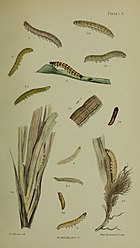| Fen wainscot | |
|---|---|

| |
| Scientific classification | |
| Domain: | Eukaryota |
| Kingdom: | Animalia |
| Phylum: | Arthropoda |
| Class: | Insecta |
| Order: | Lepidoptera |
| Superfamily: | Noctuoidea |
| Family: | Noctuidae |
| Genus: | Arenostola |
| Species: | A. phragmitidis |
| Binomial name | |
| Arenostola phragmitidis (Hübner, ) | |
| Synonyms | |
| |
Arenostola phragmitidis, the fen wainscot, is a moth of the family Noctuidae. The species was first described by Jacob Hübner in 1803. It is found in most of Europe (except Ireland, Iceland, the Iberian Peninsula and the western part of the Balkan Peninsula), western Siberia, Turkey, Iraq, Afghanistan, Central Asia and China.
Technical description and variation
For a key to the terms used, see Glossary of entomology terms.A. phragmitidis Hbn. (= semicana Esp., verecunda Ev., moravitzii Men.) (49 d). Forewing very smooth, pale ochreous, becoming pale brownish red towards termen; the fringe dark at tips; hindwing pale greyish ochreous; — the ab. rufescens Tutt (49 d) is flushed throughout with deep flesh colour; ab. pallida Tutt (49 e), the usual British form, is smooth pale ochreous throughout; ab. olivescens ab. nov. (49 e), is smooth olive grey, the hindwing dark grey. Larva bone-colour; subdorsal line somewhat interrupted, broad, purplish-fuscous; lateral lines similar, but narrower; head black; thoracic plate brown. The wingspan is 32–36 mm.
Biology
Adults are on wing from July to August.

The larvae feed internally in the stems of Phragmites australis.
References
- Warren. W. in Seitz, A. Ed., 1914 Die Großschmetterlinge der Erde, Verlag Alfred Kernen, Stuttgart Band 3: Abt. 1, Die Großschmetterlinge des palaearktischen Faunengebietes, Die palaearktischen eulenartigen Nachtfalter, 1914
 This article incorporates text from this source, which is in the public domain.
This article incorporates text from this source, which is in the public domain.
External links
- Kimber, Ian. "73.137 BF2377 Fen Wainscot Arenostola phragmitidis (Hübner, [1803])". UKMoths. Retrieved 28 June 2019.
- Fauna Europaea
- Lepiforum e.V.
| Taxon identifiers | |
|---|---|
| Arenostola phragmitidis |
|
This Acronictinae article is a stub. You can help Misplaced Pages by expanding it. |